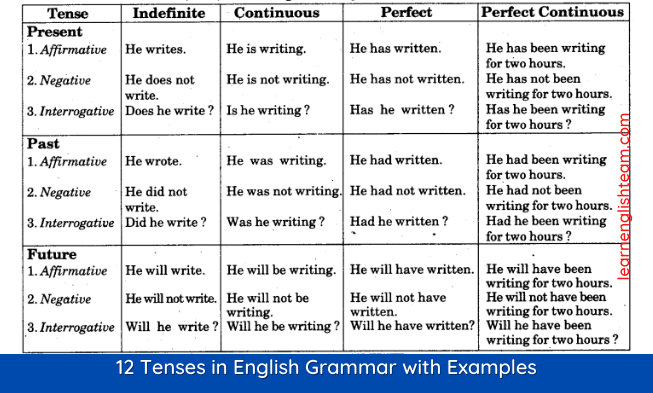

Mastering the 12 tenses in English grammar is essential for effective communication and writing. In this guide, we break down each tense with easy-to-understand example sentences, ensuring you grasp the nuances of English grammar quickly. Plus, don’t miss out on our free downloadable PDFs that provide quick-reference guides for each tense, making your learning journey even easier!

English has 12 basic tenses which are divided into three main categories: past, present and future. All tenses have different forms for affirmative, negative and interrogative statements.
Here are the 12 tenses in English grammar with examples:
⇒used to describe habits, general truths, and everyday activities.
Example :
Affirmative: I play soccer every Saturday.
Negative: I do not play soccer on any day other than Saturday.
Interrogative: Do I play soccer every day of the week?
⇒used to describe an ongoing action in the present.
Example :
Affirmative: I am playing soccer right now.
Negative: I am not playing soccer right now.
Interrogative: Am I playing soccer right now?
⇒used to describe a completed action in the past.
Example :
Affirmative: I played soccer yesterday.
Negative: I did not play soccer yesterday.
Interrogative: Did I play soccer yesterday?
⇒used to describe an ongoing action in the past.
Example :
Affirmative: I was playing soccer when she called.
Negative: I was not playing soccer when she called.
Interrogative: Was I playing soccer when she called.
⇒used to describe a future action or event.
Example :
Affirmative: I will play soccer tomorrow.
Negative: I will not play soccer tomorrow.
Interrogative: Will I play soccer tomorrow?
⇒used to describe an ongoing action in the future.
Example :
Affirmative: I will be playing soccer at this time tomorrow.
Negative: I will not be playing soccer at this time tomorrow.
Interrogative: Will I be playing soccer at this time tomorrow.
⇒used to express that an action happened at an unspecified time before now. The exact time is not important.
Example :
Affirmative: I have played soccer.
Negative: I have not played soccer.
Interrogative: Have I played soccer?
⇒used to describe an ongoing action that started in the past and continues up to the present.
Example :
Affirmative: I have been playing soccer for an hour.
Negative: I have not been playing soccer for an hour.
Interrogative: Have I been playing soccer for an hour?
⇒used to describe a completed action before another action in the past.
Example :
Affirmative: I had played soccer before I went to the party.
Negative: I had not played soccer before I went to the party.
Interrogative: Had I played soccer before I went to the party?
⇒used to describe an ongoing action that continued up until a point in the past.
Example :
Affirmative: I had been playing soccer for two hours before the game ended.
Negative: I had not been playing soccer for two hours before the game ended.
Interrogative: Had I been playing soccer for two hours before the game ended?
⇒used to describe a future action that will be completed at a specific time.
Example :
Affirmative: By next year, I will have played soccer for ten years.
Negative: By next year, I will not have played soccer for ten years.
Interrogative: Will I have played soccer for ten years by next year?
⇒used to describe an ongoing action that will continue up until a specific time in the future.
Example :

Affirmative: By the end of the day, I will have been playing soccer for six hours.
Negative: By the end of the day, I will not have been playing soccer for six hours.
Interrogative: Will I have been playing soccer for six hours by the end of the day.